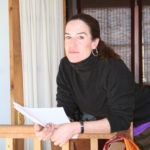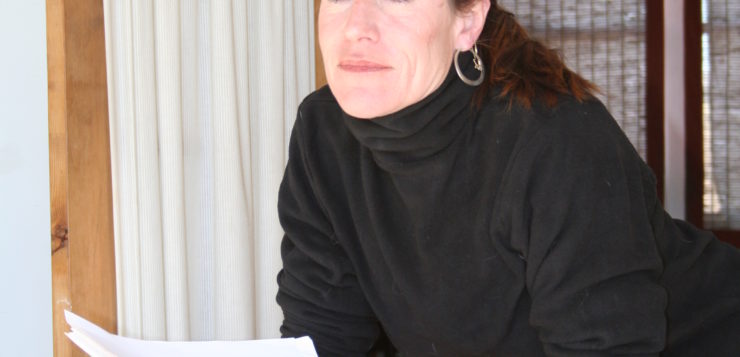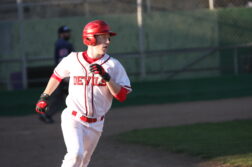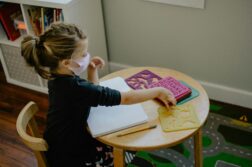His name was Stefan. No one called him my older brother’s lover. John hadn’t come out yet, even to me. The two men could have just been friends. I was twenty. It was 1977. I hadn’t been in love yet, but I had been wanted.
Stefan sported a faux-British accent, his voice deep and drawn out, vaguely congested. He was dark and smoky with a high, chiseled forehead and square blunt nose. He wore his black hair long in front, which caused him to frequently flip his bangs back over that expanse of forehead and out of his molten eyes, like he was trying to clear the air, or emphasize what he’d just said. He smoked dark tobacco—Gauloises—and always smelled of it, too. And he liked to cook, making textured meals like Cassoulet and duck confit. We would spend long hours talking and drinking in my brother’s and his tiny dark kitchen in London Terrace Apartments on 24th and 9th. We ate well past moonrise. Sometimes we’d go to nearby Chelsea to soak up its history and an apricot sour or two—rubbing up against the doomed souls who still haunted those walls. We were never in a hurry. Time was a bank account with plenty of zeroes.
My trips became more about visiting Stefan than my brother. I was in love. I’d drive down to the city from Ithaca, blasting Joni Mitchell’s Court and Spark across the Northern Tier Expressway as I cocked the wheel toward Midtown in my VW Beetle, looking forward to another long weekend of drinking, talking, and eating, wandering Manhattan, and stealing Stefan.
My brother was only peripherally in the picture on those weekends. I wanted Stefan all to myself. I remember waiting up for him, snuggled in his bed, which he gave up for me on these visits, keeping it warm for him like a good lover as he went out on the town by himself. He never mentioned where he went. I waited and waited. He took what felt like an eternity to get off the elevator, walk down the uncarpeted hallway, fumble for the lock, and let himself in, often pouring another drink, lighting another Gauloise, sitting with a book, or sometimes even in the dark to listen to the traffic waking up on the floors below. I longed for him to come to me through the blaring of horns and farting of buses, and the dark musty smells of that ninth floor apartment. But he never did. I talked myself into the wonderful forbidden, as one can sometimes do when imagining love.
One early morning, I woke to Stefan’s presence, Gauloise in one hand, stroking a lap-bound Himalayan cat with the other. Someone “gave” it to him on the street. I never did find out how Stefan really ended up with the cat, though it was most likely exchanged for something I didn’t want to know about.
My brother and Stefan eventually split. I fell in love with a dozen other boys who never loved me back. I went to graduate school in Boston, took a first teaching job in Arizona, and met a man, finally, who said he loved me almost as much as his own art.
I met up with Stefan at the Plaza Hotel Tea Room several years later, on a trip to visit my brother. Stefan was smoking the usual dark cigarette and batting the ashes into a nearby potted fern.
“You look well,” he said to me as I arrived, breathless and soaked, from heavy traffic in a downpour. He looked pasty and pale, with a coating of sweat that he kept wiping off that lovely forehead. Life was great. He had stopped drinking and was working at a Methadone clinic. He was seeing someone new who promised love.
A few years later, my new husband and I settled in Baltimore. We were thinking about starting a family when Stefan called. I was so glad to hear his voice. Not long after, he said: “I don’t want to upset you, Julia, but I have AIDS.” He had been given a death sentence, and yet his first concern was of upsetting me. He was gone within a few months. He died at St. Vincent’s Hospital. I lost track of his new partner. My brother was spared.
It was the start of a long line of many losses. My love for the man who once loved my brother represented a yearning in myself that I never fully understood. Was it love, or was it merely a youthful vacuum that longed to be filled? A desire to be that close to someone, to talk and be heard, combined with an unfounded panic that it would never happen? I was convinced that dark love was all that was available to me.
My brother was oddly unmoved by Stefan’s death. But maybe he was just hiding, or angry about things I had no right to know. I lost what I could never understand. Stefan was 35, older than so many of the young men who died in that era, before antiretroviral drugs were introduced for the luckier ones. His Himalayan cat, who long ago went to me, would live for another eighteen years.
Shortly before Stefan’s death, my husband went to St. Vincent’s to interview Stefan for an article he was writing on AIDS. I remember the sound of that hollow voice, repeatedly breaking to moisten his lips with a sponge—the rough intake of air through impossibly congested passageways, as a specter-like voice talked about the life he was leaving. Every death and broken life teaches you something. From Stefan I learned that there are so many different ways to open the bloom of oneself, and to brighten a world that was slowly, inexorably, killing you.

Julia Wendell’s memoir, Come to the X, will be published by Galileo Press in April, 2020. Her most recent book of poems is Take This Spoon (Main Street Rag Press 2014). Julia lives in South Carolina and is a three-day event rider.







Discussion3 Comments
Beautifully written and so very touching!
I was mesmerized by your writing Julia
I struggle to tell you how much I enjoyed, that’s not the right word, how I experienced in a warm, wonderful way your story. I forbid myself from longing, like you described, for fear I would be found out. I missed AIDS by being married. I wish I had found a man or woman that made me feel like you did about Stefan.
Best wishes for success with you novel. John